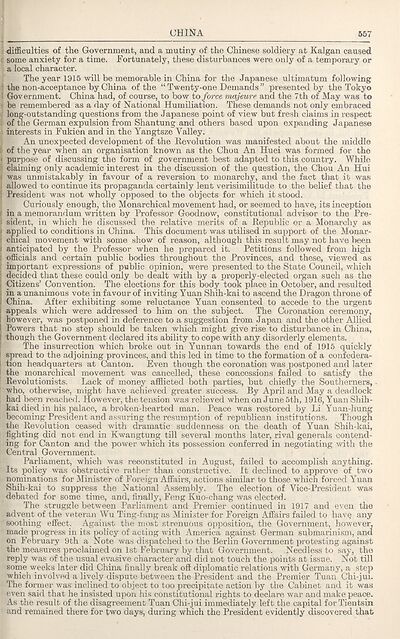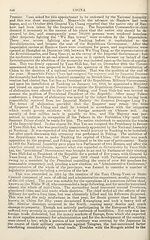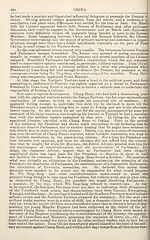1926
(613) Page 557
Download files
Complete book:
Individual page:
Thumbnail gallery: Grid view | List view

CHINA
557
i .difficulties of the Government, and a mutiny of the Chinese soldiery at Kalgan caused
r. some anxiety for a time. Fortunately, these disturbances were only of a temporary or
a local character.
The year 1915 will be memorable in China for the Japanese ultimatum following
1 the non-acceptance by China of the “ Twenty-one Demands ” presented by the Tokyo
'Government. China had, of course, to bow to force majeure and the 7 th of May was to
be remembered as a day of National Humiliation. These demands not only embraced
t long-outstanding questions from the Japanese point of view but fresh claims in respect
I of the German expulsion from Shantung and others based upon expanding Japanese
! interests in Fukien and in the Yangtsze Valley.
I An unexpected development of the Revolution was manifested about the middle
t of the year when an organisation known as the Chou An Huei was formed for the
I purpose of discussing the form of government best adapted to this country. While
I claiming only academic interest in the discussion of the question, the Chou An Hui
« was unmistakably in favour of a reversion to monarchy, and the fact that it was
| allowed to continue its propaganda certainly lent verisimilitude to the belief that the
} President was not wholly opposed to the objects for which it stood.
_ ■ Curiously enough, the Monarchical movement had, or seemed to have, its inception
i in a memorandum written by Professor Goodnow, constitutional advisor to the Pre-
i sident, in which he discussed the relative merits of a Republic or a Monarchy as
j applied to conditions in China. This document was utilised in support of the Monar-
j chical movement with some show of reason, although this result may not have been
i anticipated by the Professor when he prepared it. Petitions followed from high
officials and certain public bodies throughout the Provinces, and these, viewed as
important expressions of public opinion, were presented to the State Council, which
decided that these could only be dealt with by a properly-elected organ such as the
■Citizens’ Convention. The elections for this body took place in October, and resulted
in a unanimous vote in favour of inviting Yuan Shih-kai to ascend the Dragon throne of
China. After exhibiting some reluctance Yuan consented to accede to the urgent
appeals which were addressed to him on the subject. The Coronation ceremony,
however, was postponed in deference to a suggestion from Japan and the other Allied
Powers that no step should be taken which might give rise to disturbance in China,
though the Government declared its ability to cope with any disorderly elements.
The insurrection which broke out in Yunnan towards the end of 1915 quickly
spread to the adjoining provinces, and this led in time to the formation of a confedera¬
tion headquarters at Canton. Even though the coronation was postponed and later
the monarchical movement was cancelled, these concessions failed to satisfy the
Revolutionists. Lack of money afflicted both parties, but chiefly the Southerners,
i who, otherwise, might have achieved greater success. By April and May a deadlock
I had been reached. However, the tension was relieved when on June 5th, 1916, Yuan Shih-
kai died in his palace, a broken-hearted man. Peace was restored by Li Yuan-hung
i becoming President and assuring the resumption of republican institutions. Though
the Revolution ceased with dramatic suddenness on the death of Yuan Shih-kai,
I lighting did not end in Kwangtung till several months later, rival generals contend-
| ing for Canton and the power which its possession conferred in negotiating with the
I Central Government.
I Parliament, which was reconstituted in August, failed to accomplish anything.
! Its policy was obstructive rather- than constructive. It declined to approve of two
| nominations for Minister of Foreign Affairs, actions similar to those which forced Yuan
Shih-kai to suppress the National Assembly. The election of Vice-President was
debated for some time, and, finally, Feng Kuo-chang was elected.
The struggle between Parliament and Premier continued in 1917 and even the
advent of the veteran Wu Ting-fang as Minister for Foreign Affairs failed to have any
soothing effect. Against the most strenuous opposition, the Government, however,
• made progress in its policy of acting with America against German submarinism, and
on February 9th a Note was dispatched to the Berlin Government protesting against
the measures proclaimed on 1st February by that Government. Needless to say, the
reply was of the usual evasive character and did not touch the points at issue. Not till
some weeks later did China finally break off diplomatic relations with Germany, a step
which involved a lively dispute between the President and the Premier Tuan Chi-jui.
The former was inclined to object to too precipitate action by the Cabinet and it was
even said that he insisted upon his constitutional rights to declare war and make peace.
As the result of the disagreement Tuan Chi-jui immediately left the capital for Tientsin
and remained there for two days, during which the President evidently discovered that
557
i .difficulties of the Government, and a mutiny of the Chinese soldiery at Kalgan caused
r. some anxiety for a time. Fortunately, these disturbances were only of a temporary or
a local character.
The year 1915 will be memorable in China for the Japanese ultimatum following
1 the non-acceptance by China of the “ Twenty-one Demands ” presented by the Tokyo
'Government. China had, of course, to bow to force majeure and the 7 th of May was to
be remembered as a day of National Humiliation. These demands not only embraced
t long-outstanding questions from the Japanese point of view but fresh claims in respect
I of the German expulsion from Shantung and others based upon expanding Japanese
! interests in Fukien and in the Yangtsze Valley.
I An unexpected development of the Revolution was manifested about the middle
t of the year when an organisation known as the Chou An Huei was formed for the
I purpose of discussing the form of government best adapted to this country. While
I claiming only academic interest in the discussion of the question, the Chou An Hui
« was unmistakably in favour of a reversion to monarchy, and the fact that it was
| allowed to continue its propaganda certainly lent verisimilitude to the belief that the
} President was not wholly opposed to the objects for which it stood.
_ ■ Curiously enough, the Monarchical movement had, or seemed to have, its inception
i in a memorandum written by Professor Goodnow, constitutional advisor to the Pre-
i sident, in which he discussed the relative merits of a Republic or a Monarchy as
j applied to conditions in China. This document was utilised in support of the Monar-
j chical movement with some show of reason, although this result may not have been
i anticipated by the Professor when he prepared it. Petitions followed from high
officials and certain public bodies throughout the Provinces, and these, viewed as
important expressions of public opinion, were presented to the State Council, which
decided that these could only be dealt with by a properly-elected organ such as the
■Citizens’ Convention. The elections for this body took place in October, and resulted
in a unanimous vote in favour of inviting Yuan Shih-kai to ascend the Dragon throne of
China. After exhibiting some reluctance Yuan consented to accede to the urgent
appeals which were addressed to him on the subject. The Coronation ceremony,
however, was postponed in deference to a suggestion from Japan and the other Allied
Powers that no step should be taken which might give rise to disturbance in China,
though the Government declared its ability to cope with any disorderly elements.
The insurrection which broke out in Yunnan towards the end of 1915 quickly
spread to the adjoining provinces, and this led in time to the formation of a confedera¬
tion headquarters at Canton. Even though the coronation was postponed and later
the monarchical movement was cancelled, these concessions failed to satisfy the
Revolutionists. Lack of money afflicted both parties, but chiefly the Southerners,
i who, otherwise, might have achieved greater success. By April and May a deadlock
I had been reached. However, the tension was relieved when on June 5th, 1916, Yuan Shih-
kai died in his palace, a broken-hearted man. Peace was restored by Li Yuan-hung
i becoming President and assuring the resumption of republican institutions. Though
the Revolution ceased with dramatic suddenness on the death of Yuan Shih-kai,
I lighting did not end in Kwangtung till several months later, rival generals contend-
| ing for Canton and the power which its possession conferred in negotiating with the
I Central Government.
I Parliament, which was reconstituted in August, failed to accomplish anything.
! Its policy was obstructive rather- than constructive. It declined to approve of two
| nominations for Minister of Foreign Affairs, actions similar to those which forced Yuan
Shih-kai to suppress the National Assembly. The election of Vice-President was
debated for some time, and, finally, Feng Kuo-chang was elected.
The struggle between Parliament and Premier continued in 1917 and even the
advent of the veteran Wu Ting-fang as Minister for Foreign Affairs failed to have any
soothing effect. Against the most strenuous opposition, the Government, however,
• made progress in its policy of acting with America against German submarinism, and
on February 9th a Note was dispatched to the Berlin Government protesting against
the measures proclaimed on 1st February by that Government. Needless to say, the
reply was of the usual evasive character and did not touch the points at issue. Not till
some weeks later did China finally break off diplomatic relations with Germany, a step
which involved a lively dispute between the President and the Premier Tuan Chi-jui.
The former was inclined to object to too precipitate action by the Cabinet and it was
even said that he insisted upon his constitutional rights to declare war and make peace.
As the result of the disagreement Tuan Chi-jui immediately left the capital for Tientsin
and remained there for two days, during which the President evidently discovered that
Set display mode to:
![]() Universal Viewer |
Universal Viewer | ![]() Mirador |
Large image | Transcription
Mirador |
Large image | Transcription
Images and transcriptions on this page, including medium image downloads, may be used under the Creative Commons Attribution 4.0 International Licence unless otherwise stated. ![]()
| Asian directories and chronicles > 1926 > (613) Page 557 |
|---|
| Permanent URL | https://digital.nls.uk/196496142 |
|---|
| Attribution and copyright: |
|
|---|---|
| Description | Volumes from the Asian 'Directory and Chronicle' series covering 1917-1941, but missing 1919 and 1923. Compiled annually from a multiplicity of local sources and research. They provide listings of each country's active corporations, foreign residents and government agencies of all nationalities for that year, together with their addresses. Content includes: various treaties; coverage of conflicts; currencies and taxes; consular fees; weights and measures; public holidays; festivals and traditions. A source of information for both Western states and communities of foreigners living in Asia. Published by Hongkong Daily Press. |
|---|---|
| Shelfmark | H3.86.1303 |
| Additional NLS resources: |

